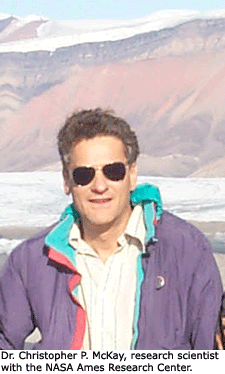News Archives - 2001
Augsburg College presents lecture by Dr. Christopher P. McKay

As part of the 2000-01 Augsburg College Convocation Series the 2001 Sverdrup Visiting Scientist Program will take place Monday and Tuesday, April 9-10, 2001 at Augsburg College. This year's featured scientist is Dr. Chris McKay, Planetary Scientist, Space Science Division, NASA Ames. Below are two presentations open to the general public. If you would like a poster or more information concerning other Sverdrup Visiting Lecture presentations with Dr. McKay, please call (612)330-1324.
Sverdrup Lecture: "From Antarctica to Mars: The Search for Life in Cold, Dry Places." Monday, April 9, 8:00 P.M. Hoversten Chapel, Foss Center
ABSTRACT: Mars appears to be cold dry and dead world. However there is good evidence that early in its history it had liquid water, more active volcanism, and a thicker atmosphere. Mars had this earth-like environment over three and a half billion years ago, during the same time that life appeared on Earth. The main question in the exploration of Mars then is the search for a independent origin of life on that planet. Ecosystems in cold, dry locations on Earth - such as the Antarctic - provide examples of how life on Mars might have survived and where to look for fossils.
Sverdrup Colloquium: "The Physics, biology and Ethics of Making Mars Habitable" Tuesday, April 10, Noon, Science 123
ABSTRACT: It is possible that at some time in the future we might recreate a habitable climate on Mars, returning it to the life-bearing state it may have enjoyed early in its history. Our studies of Mars are still in a preliminary state but everything we have learned suggests that it may be possible to restore Mars to a habitable climate on time scales of 100 years. The physics, biology, and environmental ethics of making Mars a habitable world can help illuminate our own habitable planet.
BIOGRAPHY: McKay received his Ph.D. in Astro-geophysics from the University of Colorado in 1982 and has been a research scientist with the NASA Ames Research Center since that time. His current research focuses on the evolution of the solar system and the origin of life. He is also actively involved in planning for future Mars missions including human settlements. McKay has been involved with polar research since 1980, traveling to the Antarctic dry valleys and more recently to the Siberian and Canadian Arctic to conduct research in these Mars-like environments.
For more information concerning initiatives, projects and general information
concerning this topic visit the following web sites:
- FAS "Life on Mars?" Space Policy
Project
- Scientific American "Bringing Life to Mars"
- Malin Space Science System
"Life on Mars"
- The "Mars Millennium
Project" Web page on Christopher McKay
- Article by Christopher
McKay "Balancing the Rights of Indigenous Martian Life over Human
Explorations"
Presentations are free and open to the public.